|
|
|
Sort Order |
|
|
|
Items / Page
|
|
|
|
|
|
|
| Srl | Item |
| 1 |
ID:
165273
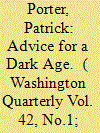

|
|
|
| 2 |
ID:
108882
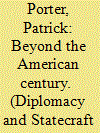

|
|
|
|
|
| Publication |
2011.
|
| Summary/Abstract |
As the United States became a world Power, journalist and intellectual Walter Lippmann feared that it would become its own worst enemy. During and after the Second World War, he tried to steer the country towards coherent statecraft, to define the national interest and the limits of power, and give geopolitical expression to the role of the United States as the core of an Atlantic strategic system. But in response to world war, the Truman Doctrine, and the Korean War, he became pessimistic about the country's ability to conduct strategy effectively. In the prophetic tradition, he believed that a fatal symbiosis between America's growing strength and domestic politics led it towards crisis. Though at times ahistorical, Lippmann's concept of strategy deserves attention for its dialogue between power and identity, for its questioning of "ends" as well as means, and for its focus on the danger of self-defeating behaviour.
|
|
|
|
|
|
|
|
|
|
|
|
|
|
|
|
| 3 |
ID:
178762


|
|
|
|
|
| Summary/Abstract |
Political realists disagree on what America should “do” and “be” in the Middle East. All are skeptical toward extravagant geopolitical projects to transform the region. Yet they differ over whether hegemony in the Gulf and its wider environs are worth the substantial investment of blood and treasure. Hegemonic “primacy realism” finds the commitment effective and affordable, and that Washington should stay to stabilize the region to ensure a favorable concentration of power. There is an alternative “shield of the republic” realism, however, which views the pursuit of armed supremacy in the Middle East as harming political order at home, reducing security more than generating it, and costing too much for too little gain. It involves interests that are either manageable from a remove or largely generated by being there in the first place. In this article, we lay out the latter position, arguing that the unruly Gulf is increasingly peripheral to US national interests. The region is losing its salience grand strategically, entanglement and continuous war damage republican liberties, and the calculus of whether continued hegemony is “worth it” has shifted decisively toward the downside. The time for abandonment has come.
|
|
|
|
|
|
|
|
|
|
|
|
|
|
|
|
| 4 |
ID:
079206


|
|
|
| 5 |
ID:
132282
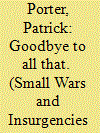

|
|
|
|
|
| Publication |
2014.
|
| Summary/Abstract |
This article reflects on a decade of British counterinsurgency operations. Questioning the idea that lessons have been learnt, the paper challenges the assumptions that are being used to frame future strategic choice. Suggesting that defence engagement is primarily focused on optimising overseas interventions while avoiding a deeper strategic reassessment about whether the UK should be undertaking these sorts of activities, the article calls for a proper debate on Britain's national security interests.
|
|
|
|
|
|
|
|
|
|
|
|
|
|
|
|
| 6 |
ID:
095066


|
|
|
|
|
| Publication |
2010.
|
| Summary/Abstract |
At the heart of the 'special relationship' ideology, there is supposed to be a grand bargain. In exchange for paying the 'blood price' as America's ally, Britain will be rewarded with exceptional influence over American foreign policy and its strategic behaviour. Soldiers and statesman continue to articulate this idea. Since 9/11, the notion of Britain playing 'Greece' to America's 'Rome' gained new life thanks to Anglophiles on both sides of the Atlantic. One potent version of this ideology was that the more seasoned British would teach Americans how to fight 'small wars' in Iraq and Afghanistan, thereby bolstering their role as tutor to the superpower. Britain does derive benefits from the Anglo-American alliance and has made momentous contributions to the wars in Afghanistan and Iraq. Yet British solidarity and sacrifices have not purchased special influence in Washington. This is partly due to Atlanticist ideology, which sets Britain unrealistic standards by which it is judged, and partly because the notion of 'special influence' is misleading as it loses sight of the complexities of American policy-making. The overall result of expeditionary wars has been to strain British credibility in American eyes and to display its lack of consistent influence both over high policy and the design and execution of US military campaigns. While there may be good arguments in favour of the UK continuing its efforts in Afghanistan, the notion that the war fortifies Britain's vicarious world status is a dangerous illusion that leads to repeated overstretch and disappointment. Now that Britain is in the foothills of a strategic defence review, it is important that the British abandon this false consciousness.
|
|
|
|
|
|
|
|
|
|
|
|
|
|
|
|
| 7 |
ID:
086949


|
|
|
|
|
| Publication |
2009.
|
| Summary/Abstract |
Can history help the 'war on terror'? It is a cliché that 9/11 changed the world. But the idea that the war is exceptional lacks historical perspective. Assuming a radically new threat, the Bush administration proclaimed a theology rather than a coherent strategy. It articulated the 'war on terror' as a utopian and unbounded quest for absolute security. It did not effectively measure costs against risks or orchestrate ends, ways and means. This led the United States into exhausting wars of attrition. A more careful dialogue with the past can address this. Containment, America's core idea during the Cold War, supplies a logic that can inform a prudent strategy. Like Soviet communism with its fatal self-contradictions, Al-Qaeda and its terror network is ultimately self-destructive without major military operations. America and its allies can contain it with more limited measures in the long term as it destroys itself. The US should show restraint, doing nothing to hinder the growing Islamic revolt against Al-Qaeda. In other words, fight small and wait.
|
|
|
|
|
|
|
|
|
|
|
|
|
|
|
|
| 8 |
ID:
113863


|
|
|
|
|
| Publication |
2012.
|
| Summary/Abstract |
American policy-makers are predisposed towards the idea of a necessary war of survival, fought with little room for choice. This reflects a dominant memory of World War II that teaches Americans that they live in a dangerously small world that imposes conflict. Critics argue that the 'choice versus necessity' schema is ahistorical and mischievous. This article offers supporting fire to those critiques. America's war against the Axis (1941-45) is a crucial case through which to test the 'small world' view. Arguments for war in 1941 pose overblown scenarios of the rise of a Eurasian super-threat. In 1941 conflict was discretionary and not strictly necessary in the interests of national security. The argument for intervention is a closer call that often assumed. This has implications for America's choices today.
|
|
|
|
|
|
|
|
|
|
|
|
|
|
|
|
| 9 |
ID:
091569
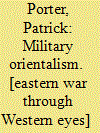

|
|
|
|
|
| Publication |
London, Hurst and Company, 2009.
|
| Description |
x, 263p.
|
| Standard Number |
9781850659594
|
|
|
|
|
|
|
|
|
|
|
|
Copies: C:1/I:0,R:0,Q:0
Circulation
| Accession# | Call# | Current Location | Status | Policy | Location |
| 054488 | 355.02095/POR 054488 | Main | Withdrawn | General | |
|
|
|
|
| 10 |
ID:
181611


|
|
|
|
|
| Summary/Abstract |
The issue is not whether the United States will pursue an “open world,” but how, and how expensively, it is forced to adjust to the realities of international life before the consequences of the doctrine run amok.
|
|
|
|
|
|
|
|
|
|
|
|
|
|
|
|
| 11 |
ID:
145675
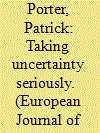

|
|
|
|
|
| Summary/Abstract |
If we can’t reliably predict the future, how can we be wise when preparing for it? Examining the UK’s ‘Strategic Defence and Security Review’ of 2010, I demonstrate that though planners often rightly invoke uncertainty, they also imply a highly certain ideology about Western power and foresight. Modern ‘national security states’ describe the world as dangerously uncertain, yet fall prey to a misplaced confidence in their ability to anticipate and prevent threats. I argue that classical realism, especially that of Clausewitz and Morgenthau, is a valuable resource for handling uncertainty more reflexively. Classical realism counsels that governments should go beyond attempts to improve foresight. They should try to check against the fallibility of their assumptions, marshal their power more conservatively, insure against the likelihood of predictive failure by developing the intellectual capability to react to the unknown, and avoid misplaced confidence in their ability to bring order into chaos.
|
|
|
|
|
|
|
|
|
|
|
|
|
|
|
|
| 12 |
ID:
159472


|
|
|
|
|
| Summary/Abstract |
Why has U.S. grand strategy persisted since the end of the Cold War? Despite shocks such as the 2008 global financial crisis and the costs of the war in Iraq—circumstances that ought to have stimulated at least a revision—the United States remains committed to a grand strategy of “primacy.” It strives for military preponderance, dominance in key regions, the containment and reassurance of allies, nuclear counterproliferation, and the economic “Open Door.” The habitual ideas of the U.S. foreign policy establishment, or the “Blob,” make U.S. grand strategy hard to change. The United States' military and economic capabilities enable the U.S. government to pursue primacy, but the embedded assumptions of the Blob make primacy the seemingly natural choice. Thanks to the Blob's constraining power, alternative grand strategies based on restraint and retrenchment are hardly entertained, and debate is narrowed mostly into questions of execution and implementation. Two cases—the presidency of Bill Clinton and the first year of the presidency of Donald Trump—demonstrate this argument. In each case, candidates promising change were elected in fluid conditions that we would expect to stimulate a reevaluation of the United States' commitments. In each case, the Blob asserted itself successfully, at least on the grand strategic fundamentals. Change in grand strategy is possible, but it would require shocks large enough to shake the assumptions of the status quo and a president willing to be an agent of change and prepared to absorb the political costs of overhauling Washington's traditional design.
|
|
|
|
|
|
|
|
|
|
|
|
|
|
|
|
| 13 |
ID:
099238


|
|
|
| 14 |
ID:
139324


|
|
|
|
|
| Summary/Abstract |
A common assumption in the West is that distance and space are no longer key considerations in strategy and politics. ‘Over there’, the argument goes, can quickly and dangerously become ‘over here’. Yet, as Patrick Porter contends, this is a dangerous fallacy that distorts Western strategy. A proper consideration of the role of distance should not lead to disengagement or isolation, but rather to a more selective and considered – and thus more flexible – foreign and security policy.
|
|
|
|
|
|
|
|
|
|
|
|
|
|
|
|
|
|
|
|
|